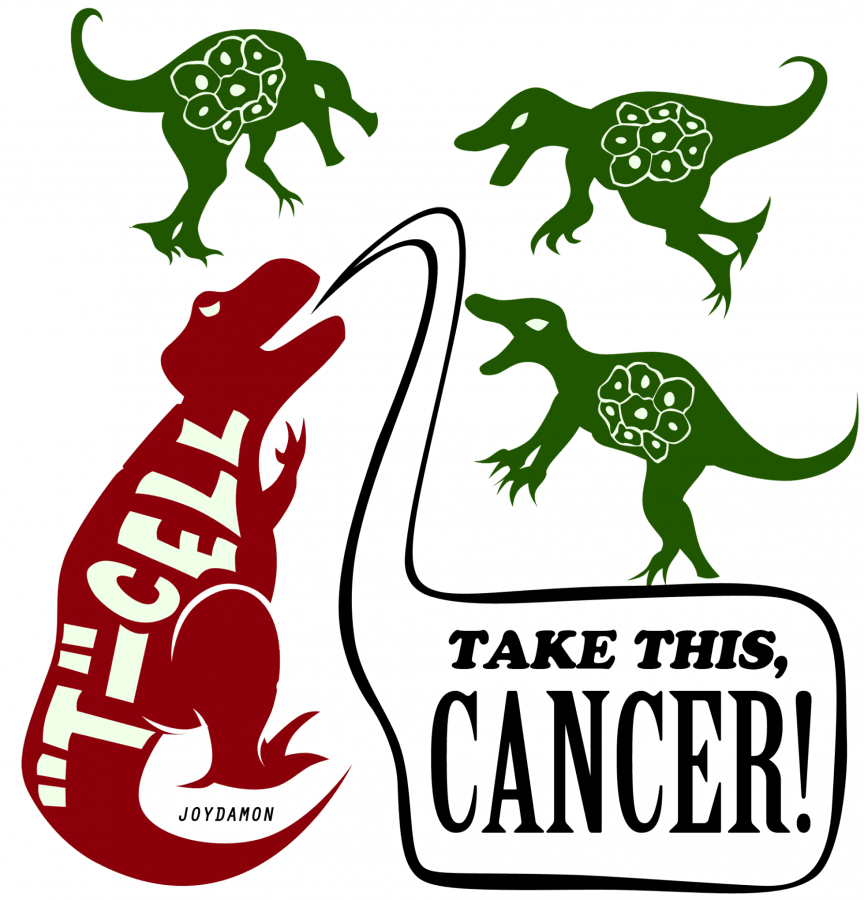Remember that scene from Jurassic Park? The one where the T-Rex saves everyone from the Velociraptors?
That scene is what a new cancer treatment is like: something from science fiction.
In a trial developed by scientists from the University of Pennsylvania’s Abramson Cancer Center and Perelman School of Medicine, a strain of the human immunodeficiency virus (HIV) was used to turn white blood cells (specifically T-cells) into blood-thirsty killers of cancer cells. Well, they may not be blood-thirsty, but the researchers are calling the cells “serial killers,” with each cell killing thousands of tumor cells, according to Penn Medicine News & Publications — and the T-cells are able to self-replicate.
MSNBC reports that the study, 20 years in the making, was not funded by the National Cancer Institute or pharmaceutical companies. The trial was actually made possible by grant money from a charity called the Alliance for Cancer Gene Therapy.
Only three patients were treated in the initial UPenn trial. All three suffered from chronic lymphocytic leukemia (CLL), a cancer in the blood and bone marrow. All three patients lost at least two pounds of tumor; the leukemia was eradicated in two patients and reduced by 70 percent in the third, according to MSNBC.
Cancer seems to be losing this fight. See the T-Rex analogy? Two monstrous killers going at each other with human lives at stake? Guilford alumna Heather Cole ’04, a forensic biology major, was amused by the analogy, but admitted she didn’t see it that way.
“No, I really do not think of it that way since this kind of thing happens in our bodies every day anyway,” said Cole through email.
Sci-fi theories aside, these diseases are undeniably serious.
The United Nations AIDS agency (UNAIDS) reports some 25 million deaths attributed to HIV/AIDS worldwide since discovery of the disease in 1981. The National Cancer Institute estimated that over 569,000 cancer-related deaths would occur during 2010.
Fourth-year Caroline Loftus, an international studies and biology major, shadowed a radiation oncologist (oncologists specialize in tumors and cancer) during a four-week internship at Northeast Radiation Oncology Center in Dunmore, Pa. She saw various forms and levels of severity of the cancer in patients being treated there.
“I felt like I was on sensory overload for a month,” said Loftus regarding her experience. She remains skeptical about the results of this particular trial but admits that it might affect future cancer treatment.
“I believe there should be a few more years of research and clinical trials,” Loftus explained.
Penn Medicine News reports that the HIV-derived vector (a vector transfers genes or diseases from one cell to another) targets specific cells. The only cells targeted have a protein called “CD19” which is found in “CLL tumor cells and normal B-cells,” according to Penn Medicine News.
Wait. Reread that “normal B-cells” part.
“B-cells are bone cells,” said Cole. “They are a lymphocyte (white blood cell) … one of our body’s natural defense mechanisms.”
However, Penn Medicine News claims that clinical trials using the HIV vector demonstrated the vector’s safety in 2003.
So, what would you do if faced with this decision? On one hand, you have chemotherapy, or you can try to wait for a bone marrow transplant which presents a 20 percent mortality rate with a 50 percent chance of cure, according to Penn Medicine News. On the other hand, you have this experimental treatment: a step into the unknown.
Some people must be choosing the experimental treatment, based on UPenn’s statements that it will admit a few more patients as the trial reopens in the next one to two months.
Although the initial trial shows promise, further research will be needed to test the effectiveness of this treatment. Will it prove to be safe? Will cancer cells adapt to elude the modified T-cells? Is it a coincidence that the words “T-cell” and “T-Rex” resemble each other? That last question may or may not be addressed.

